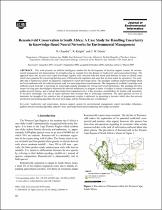| dc.contributor.author | Chandra, R. | |
| dc.contributor.author | Knight, Richard | |
| dc.contributor.author | Omlin, C. W. | |
| dc.date.accessioned | 2023-06-06T08:00:31Z | |
| dc.date.available | 2023-06-06T08:00:31Z | |
| dc.date.issued | 2009 | |
| dc.identifier.citation | Chandra, R. et al. (2009). Renosterveld conservation in South Africa: A case study for handling uncertainty in knowledge-based neural networks for environmental management. Journal of Environmental Informatics, 13 (1) ,56-65. 10.3808/jei.200900140 | en_US |
| dc.identifier.issn | 1684-8799 | |
| dc.identifier.uri | 10.3808/jei.200900140 | |
| dc.identifier.uri | http://hdl.handle.net/10566/9027 | |
| dc.description.abstract | This work presents an artificial intelligence method for the development of decision support systems for environmental
management and demonstrates its strengths using an example from the domain of biodiversity and conservation biology. The
approach takes into account local expert knowledge together with collected field data about plant habitats in order to identify areas
which show potential for conserving thriving areas of Renosterveld vegetation and areas that are best suited for agriculture. The available
data is limited and cannot be adequately explained by expert knowledge alone. The paradigm combines expert knowledge about
the local conditions with the collected ground truth in a knowledge-based neural network. The integration of symbolic knowledge with
artificial neural networks is becoming an increasingly popular paradigm for solving real-world applications. The paradigm provides
means for using prior knowledge to determine the network architecture, to program a subset of weights to induce a learning bias which
guides network training, and to extract knowledge from trained networks; it thus provides a methodology for dealing with uncertainty
in the prior knowledge. The role of neural networks then becomes that of knowledge refinement. The open question on how to
determine the strength of the inductive bias of programmed weights is addressed by presenting a heuristic which takes the network
architecture and training algorithm, the prior knowledge, and the training data into consideration. | en_US |
| dc.language.iso | en | en_US |
| dc.publisher | International Society for Environmental Information Sciences | en_US |
| dc.subject | Biodiversity | en_US |
| dc.subject | Conservation | en_US |
| dc.subject | South Africa | en_US |
| dc.subject | Artificial Intelligence | en_US |
| dc.subject | Biology | en_US |
| dc.title | Renosterveld conservation in South Africa: A case study for handling uncertainty in knowledge-based neural networks for environmental management | en_US |
| dc.type | Article | en_US |

